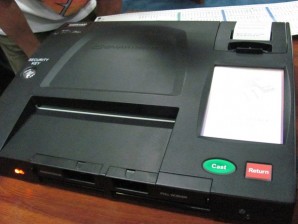The Supreme Court said the Commission on Elections (Comelec) can still push through with an automated election in the country even if it has nullified the P268.8-million contract between the poll body and Smartmatic-TIM.
In a 56-page decision released Friday, the tribunal said the Precinct Count Optical Scan (PCOS) machines can still be used in upcoming elections in the country.
The high court said it has not prohibited the reuse of the PCOS machines, adding it only voided the earlier contract for the diagnostic and repair of these machines forged by the Comelec with Smartmatic-TIM (Total Information Management Corp.) because the Comelec “failed to justify its resort to direct contracting with Smartmatic-TIM.”
The contract, forged under Comelec Resolution 9922, also failed to comply with the requirements set under Republic Act 9184, or the Government Procurement Reform Act (GPRA), the high court said.
Petitioners AES and the Integrated Bar of the Philippines earlier filed petitions asking the high tribunal to nullify Comelec Resolution 9922 for violation of the Constitution and of the GPRA.
In its decision penned by Associate Justice Estela Perlas-Bernabe, the tribunal stressed that it “does not stand to thwart the conduct of automated elections; but only steps in to preserve its sanctity [of the contract].”
It said Comelec can still resort to direct contracting as long as it fulfills the condition under GPRA.
“The disposition of these cases does not prohibit the Comelec from resorting to direct contracting anew or other alternative method of procurement with any service contractor, subject to compliance with the conditions provided in the GPRA and all the pertinent rules and procedures,” the high court said.
Section 50 of the GPRA allows direct contracting only upon existence of any of three conditions: procurement can be obtained only from the proprietary source; procurement is a condition precedent to hold a contractor to guarantee its project performance, in accordance with the provisions of his contract; or those sold by an exclusive dealer or manufacturer, which does not have sub-dealers selling at lower prices and for which no suitable substitute can be obtained at more advantageous terms to the Government.
The high court said that none of these conditions were met in the voided Smartmatic contract under Comelec Resolution No. 9922 and the Extended Warranty Contract (Program 1).
“Bluntly, the Comelec has failed to justify its reasons for directly contracting with Smartmatic-TIM: it had not shown that any of the conditions under Section 50, Article XVI of the GPRA exists; its claims of impracticality were not supported by independently verified and competent data; and lastly, its perceived ‘warranty extension’ is, in reality, just a circumvention of the procurement law,” it pointed out.
“While this Court recognizes that the Comelec should be given sufficient leeway in exercising its constitutional mandate to enforce and administer all election laws, it demands equal recognition that it is the Court’s constitutional duty to see to it that all governmental actions are legally permissible. In so doing, the Court decides not only with pragmatism in mind, but pragmatism within the fair bounds of law,” it further explained.
